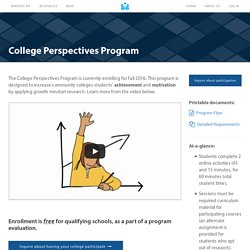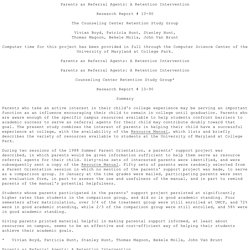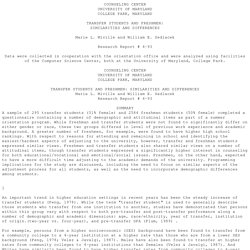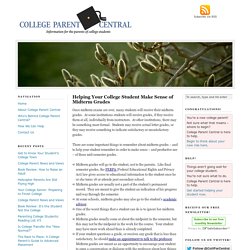

The Thriving Quotient - The Thriving Project. The Thriving QuotientTM The Thriving QuotientTM (TQ) is an instrument that was developed to measure the academic, social, and psychological aspects of a student’s college experience that are most predictive of academic success, institutional fit, satisfaction with college, and ultimately graduation.

The 25 items on the TQ cluster onto 5 scales: The TQ was developed over a period of five years by Dr. Laurie Schreiner, Professor of Higher Education at Azusa Pacific University. Working with her research team of doctoral students, the instrument has been refined to its current state. Psychometric Properties The revised TQ, consisting of these 25 items on 5 scales, is highly reliable, with internal consistency estimated as Cronbach’s alpha = .91. Using the Thriving Quotient. Your Bookmarks and favorites in the cloud. Which Study Habits Can You Improve? Resources for growth and learning mindsets. L2FwcGhvc3RpbmdfcHJvZC9ibG9icy9BRW5CMlVxWE02by1wNUh5Z1ZPM3h4Yi12NW1hWmhsT3E1N3NZd2lXMlNpeURCXM2JPWDZvbUppWC1ZVk5QVDFpSGJNdm9qT0RfZ3pmVUdHREl5TG1fcU5qUDFsOERDZy5veEU1QzhQOEVEUnQ4czZk.
L2FwcGhvc3RpbmdfcHJvZC9ibG9icy9BRW5CMlVxT2FtTkRaTFNLR1VJZXlmbm9TNEliTWY5NmRUN3duYkJ3RTlnQm15QVlfaGhlSmpqalhwb29OTzZRSktoRHZUTmVnamt1dGYxN2dnTVA4MUZwLUhXYWVIaTRUQS5ZbHJMaVNMS2k0T19NRUZp. 2013 Survey Report Final. Soton.ac.uk ude personalfiles users jw8 mydesktop Pre%20Print%20version%20VERSION%20. Abs2013. ID11 2056 Nelson Report 2014 %281%29 %281%29. Project-Based Learning. Community Colleges Perspectives Program. The College Perspectives Program is currently enrolling for Fall 2016.

This program is designed to increase community colleges students' achievement and motivation by applying growth mindset research. Learn more from the video below. Enrollment is free for qualifying schools, as a part of a program evaluation. Free Coaching Exercises. Awesome free coaching tools and exercises for your coaching practice.

Please Note: By downloading these free coaching tools, you agree to our licensing terms Great coaching tool to understand & build commitment to goals! More... One of the simplest and most powerful coaching exercises.More... Ideal seminar form to wrap-up a workshop or coaching call.More... Teaching & Learning Blog. 2011152. Want to Remember Everything You'll Ever Learn? Surrender to This Algorithm.
Illustration: Steven Wilson The winter sun sets in mid-afternoon in Kolobrzeg, Poland, but the early twilight does not deter people from taking their regular outdoor promenade.

Bundled up in parkas with fur-trimmed hoods, strolling hand in mittened hand along the edge of the Baltic Sea, off-season tourists from Germany stop openmouthed when they see a tall, well-built, nearly naked man running up and down the sand. Bul 2015 47216 001. LBCC - Taking Better Lecture Notes. File. NewtonJCollegeStudentDev2013. CLEI_Manual. PsycNET - Display Record. ForsythLawrenceBurnetteBaumeister2007. TEDxOaklandUniversity. Profiles1. PROFILES OF HIGH AND LOW SCORERS ON NONCOGNITIVE VARIABLES* HIGH SCORE LOW SCORE 1.

POSITIVE SELF-CONCEPT Feels confident of making it through Can express reason(s) why he/she OR CONFIDENCE graduation. Makes positive might have to leave school. Not statements about him/herself. sure he/she has ability to make Expects to do well in academic it. Feels other students are and non-academic areas. Assumes better than he/she is. Parents as Referral Agents: A Retention Intervention. Parents as Referral Agents: A Retention Intervention Research Report # 10-90 The Counseling Center Retention Study Group Vivian Boyd, Patricia Hunt, Stanley Hunt, Thomas Magoon, Bekele Molla, John Van Brunt Computer time for this project has been provided in full through the Computer Science Center of the University of Maryland at College Park.

Counseling Center Retention Study Group* Summary Parents who take an active interest in their child's college experience may be serving an important function as an influence encouraging their child to remain in college until graduation. During two sessions of the 1988 Summer Parent Orientation, a parents' support project was described, in which parents would be given information sufficient to help them serve as resource referral agents for their child. COUNSELING CENTER. Marie L.

Miville and William E. Sedlacek Research Report # 4-93 Data were collected in cooperation with the orientation office and were analyzed using facilities of the Computer Science Center, both at the University of Maryland, College Park. A sample of 295 transfer students (51% female) and 2584 freshman students (50% female) completed a questionnaire containing a number of demographic and attitudinal items as part of a summer orientation program. An important trend in higher education settings in recent years has been the steady increase of transfer students (Peng, 1978). For example, persons from a higher socioeconomic (SES) background have been found to transfer from a community college to a 4-year institution at a higher rate than those who are from a lower SES background (Peng, 1978; Velez & Javalgi, 1987).
Dr. William Sedlacek. Helping Your College Student Make Sense of Midterm Grades — College Parent Central. Once midterm exams are over, many students will receive their midterm grades.

At some institutions students will receive grades, if they receive them at all, individually from instructors. At other institutions, there may be something more formal. Students may receive actual letter grades, or they may receive something to indicate satisfactory or unsatisfactory grades. There are some important things to remember about midterm grades – and to help your student remember in order to make sense – and productive use – of these mid-semester grades. Midterm grades will go to the student, not to the parents. It is important to keep midterm grades in perspective. Related Posts: